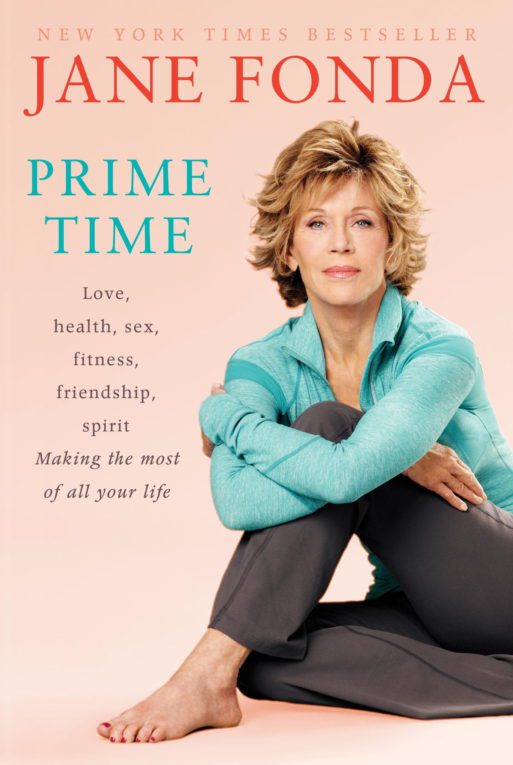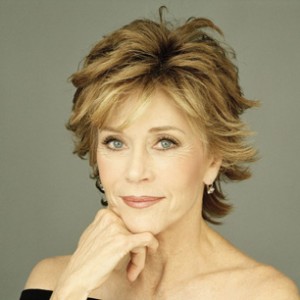 Jane Fonda, one of the most admired actresses in Hollywood, has released a new book called Prime Time: Love, health, sex, fitness, friendship, spirit–making the most of all of your life that might just change the way we think about aging. While we all know she looks great for her age, to look as truly radiant as she does at seventy-three (turning seventy-four next week) we also know there must be more to it than diet and exercise—not to mention minimal plastic surgery. Indeed, Fonda details in her book how she has confronted aging, social pressures, mortality, the benefits of green burial, and what she wishes to accomplish for herself in what she calls her “final act.”
Jane Fonda, one of the most admired actresses in Hollywood, has released a new book called Prime Time: Love, health, sex, fitness, friendship, spirit–making the most of all of your life that might just change the way we think about aging. While we all know she looks great for her age, to look as truly radiant as she does at seventy-three (turning seventy-four next week) we also know there must be more to it than diet and exercise—not to mention minimal plastic surgery. Indeed, Fonda details in her book how she has confronted aging, social pressures, mortality, the benefits of green burial, and what she wishes to accomplish for herself in what she calls her “final act.”
“I have come to believe that when you’re actually inside oldness,” she says, “as opposed to anticipating it from the outside, the fear subsides. You discover that you are still yourself, probably even more so.” This is a comforting thought considering society expects us to fear old age and deny the inevitability for as long as possible. But with this mindset Fonda outlines for us, we can look forward to growing old and being the most ourselves.
One of the defining ideas in her book is the idea that we all have three acts. The first act consists of your first thirty years of life when you are meant to learn and begin discovering yourself. The second act, from age thirty to fifty-nine, usually consists of building a career and a family. The third act, from age sixty to beyond, typically entails leisure and pleasure. But Fonda makes the case that those acts don’t need to be so fragmented, that we can have aspects of all three throughout the entirety of our lives. Fonda emphasizes the power of learning no matter what age as a way to keep our minds sharp and spirits alive, while working also doesn’t necessarily have to subside after age sixty, especially when it brings joy. And pleasure, of course, should be enjoyed from the beginning to the end of one’s life as much as we should savor moments of leisure.
In addition to giving tips on living a long, healthy life, Fonda addresses the inevitability of death and the importance of embracing our mortality while we still have the chance. She suggests doing a life review, something that can provide greater insight for your remaining years by delving into the past. “A life review can be a way to shed both hate and victimhood,” she says, “to let the pain out, and to uncover one’s true identity,” which can be crucial in arriving at a peaceful state before passing. Based on her own experience with this exercise, it seems she has found a way to focus on the important aspects of her life and let the small annoyances drift away.
“None of the centenarians I have interviewed were afraid of dying. On the contrary, their very proximity to it seems to give their lives exquisite meaning.”
With genuine empathy, Fonda also works through the fear that comes with realizing one’s mortality by tackling it with a positive perspective. Rather than looking at death as a horrible certainty, she confronts it with the understanding of its importance. “Western societies do no psychologically equip us to confront death,” she says, “It’s viewed as an indignity that needs to be ‘cleaned up.’ But if you really think about it, life exists only in relation to death, just as light exists only in relation to dark and sound only exists in relation to silence. Death gives shape and meaning to our lives. Very old people know this. None of the centenarians I have interviewed were afraid of dying. On the contrary, their very proximity to it seems to give their lives exquisite meaning.” Now what could be a more beautiful image than that?
For more information on aging well, visit: www.janefonda.com

 “Prime Time” by Jane Fonda
“Prime Time” by Jane Fonda



 First the Wealth Gap, Now the U.S. Has a Growing Health Gap
First the Wealth Gap, Now the U.S. Has a Growing Health Gap
 How to Comfort A Dying Loved One
How to Comfort A Dying Loved One
 Our Annual Seven Holiday Gifts for Someone Who Is Grieving, 2024 Edition
Our Annual Seven Holiday Gifts for Someone Who Is Grieving, 2024 Edition














